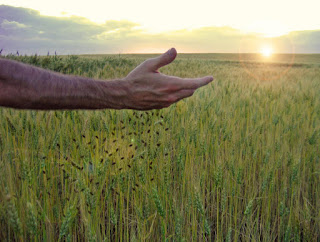Jan. 27, 2017: 3rd Week of Ordinary Time
Jan. 27, 2017: 3rd Week of Ordinary Time
Mark 4:26-29
Jesus said to the crowds:
"This is how it is with the Kingdom of God;
it is as if a man were to scatter seed on the land
and would sleep and rise night and day
and the seed would sprout and grow,
he knows not how.
Of its own accord the land yields fruit,
first the blade, then the ear, then the full grain in the ear.
And when the grain is ripe, he wields the sickle at once,
for the harvest has come."
----
In this parable the focus is on the seed’s intrinsic power to grow of its own accord. The sower liberally scatters his seed, then goes on with the routine of his daily life. Slowly, imperceptibly, the seed begins to sprout. The farmer does not know how this happens; even today, with the tremendous advances in microbiology, life remains a mystery. Nor can the farmer control the process. According to its natural stages the land yields fruit, first the blade, then the ear, then the full grain. The farmer can water, weed, and fertilize the ground as the months go on, but he cannot make the ripe grain appear a day before its appointed time. Farming requires an element of trust and patience. Yet the moment the harvest has arrived, the farmer is ready with his sickle to reap without delay. The harvest is a biblical image for the final judgment (Joel 4:13; Rev 14:14-15).
With this parable Jesus explains that the kingdom of God is a divine work, not a human achievement. God brings about its growth, which at times is imperceptible. We cooperate, but we cannot control or hasten the arrival of the kingdom by our efforts any more than the farmer can harvest his grain in January. St. Paul knew this principle well: “I planted, Apollos watered, but God caused the growth. Therefore, neither the one who plants nor the one who waters is anything, but only God, who causes the growth” (1 Cor 3:6-7).
Every member of the kingdom is being made ready for the harvest by our inner growth in holiness and virtue, which God brings about through our cooperation with his grace.
The parable serves as an encouragement for those who think their efforts for the kingdom are fruitless, and a warning for those who think they can bring about the kingdom by their own projects and programs.
By Mary Healy. "Gospel of Mark: The Catholic Commentary on Sacred Scripture
Mark 4:26-29
Jesus said to the crowds:
"This is how it is with the Kingdom of God;
it is as if a man were to scatter seed on the land
and would sleep and rise night and day
and the seed would sprout and grow,
he knows not how.
Of its own accord the land yields fruit,
first the blade, then the ear, then the full grain in the ear.
And when the grain is ripe, he wields the sickle at once,
for the harvest has come."
----
In this parable the focus is on the seed’s intrinsic power to grow of its own accord. The sower liberally scatters his seed, then goes on with the routine of his daily life. Slowly, imperceptibly, the seed begins to sprout. The farmer does not know how this happens; even today, with the tremendous advances in microbiology, life remains a mystery. Nor can the farmer control the process. According to its natural stages the land yields fruit, first the blade, then the ear, then the full grain. The farmer can water, weed, and fertilize the ground as the months go on, but he cannot make the ripe grain appear a day before its appointed time. Farming requires an element of trust and patience. Yet the moment the harvest has arrived, the farmer is ready with his sickle to reap without delay. The harvest is a biblical image for the final judgment (Joel 4:13; Rev 14:14-15).
With this parable Jesus explains that the kingdom of God is a divine work, not a human achievement. God brings about its growth, which at times is imperceptible. We cooperate, but we cannot control or hasten the arrival of the kingdom by our efforts any more than the farmer can harvest his grain in January. St. Paul knew this principle well: “I planted, Apollos watered, but God caused the growth. Therefore, neither the one who plants nor the one who waters is anything, but only God, who causes the growth” (1 Cor 3:6-7).
Every member of the kingdom is being made ready for the harvest by our inner growth in holiness and virtue, which God brings about through our cooperation with his grace.
The parable serves as an encouragement for those who think their efforts for the kingdom are fruitless, and a warning for those who think they can bring about the kingdom by their own projects and programs.
By Mary Healy. "Gospel of Mark: The Catholic Commentary on Sacred Scripture

